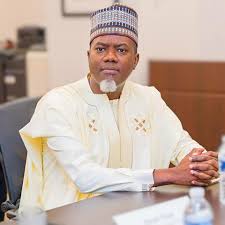Former presidential aide, Reno Omokri, recently stirred a debate by calling for a review of Nigeria’s work schedule to accommodate Muslims’ Friday prayers. According to him, it is inequitable for Christians to enjoy Sunday as a day of rest while Muslims are required to work on Fridays, despite the day’s spiritual significance to their faith.
Omokri, in a video, argued that before colonial rule, Fridays were traditionally recognised as a day of rest in Muslim communities. He therefore proposed that Nigeria should modify its work hours to allow offices to close by midday on Fridays, suggesting that the lost hours could be recovered by starting work earlier on Mondays through Thursdays.
On the surface, Omokri’s argument might appear fair. However, beneath it lies a problematic assumption that risks placing Nigeria on a slippery slope of religious concessions in a secular state.
Nigeria, as enshrined in its Constitution, is a secular state. This means that while freedom of religion is guaranteed, the State itself is not expected to tilt its policies in favour of one religion over another. Already, Sunday is recognised as a rest day largely because of the Christian influence of colonialists, but this does not mean the country must extend such recognition to every religious group.
Even at that, many journalists around the world are also working today, being a Sunday. The same thing goes for policemen, doctors, nurses, and other essential duty workers who have to work on Sundays, even when it is expected that they should keep it as a holy day of observance. Or should we also demand a day to compulsorily exercise our faith? Help me ask Reno.
In fact, in many Muslim-dominated states in Northern Nigeria, a form of compromise already exists. Offices and schools often close earlier on Fridays to allow Muslims to attend Juma’at prayers, without any need for federal legislation. This cultural adjustment works well because it respects local realities without imposing additional national burdens.
As someone who had his higher education in Ilorin—an emirate city—I witnessed firsthand how Fridays are observed. From midday, activities naturally wind down to allow Muslims to attend prayers. Non-Muslims understand and respect this practice, and society continues to function without any legal declaration that Friday is a non-working day.
So one must ask: who exactly is Reno Omokri speaking for? Have Muslims collectively demanded a national change, or is Reno stoking a debate that could inadvertently deepen religious fault lines?
Again, countries that aspire to rapid development understand the importance of productivity, consistency, and neutrality in national work schedules.
Take the United States and Europe as a classic example. Despite being Christian-majority societies, Sunday closures are increasingly a cultural practice rather than a legal imposition. Many businesses—from restaurants to retail stores—are open on Sundays. Productivity is prioritised, and religion is treated as a personal obligation, not a national mandate.
Also, the United Arab Emirates (UAE), until lately, observed Friday–Saturday as its weekend. But in 2022, it shifted to a Saturday–Sunday weekend to align with global markets and improve competitiveness. To accommodate religious obligations, government offices close at noon on Fridays for Juma’at prayers. This way, Muslims meet their obligations while the nation remains economically competitive.
Also, in Malaysia and Indonesia, other Muslim-majority nations, they strike a balance by maintaining Friday as a workday but adjusting hours to allow for prayers. Productivity remains intact, and no blanket national “religious holiday” exists beyond the recognised public holidays.
More so, in South-East Nigeria lies another cautionary tale. Since 2021, the region has struggled with the enforced “sit-at-home” every Monday by non-state actors. The economic cost has been staggering—millions of naira lost weekly, disrupted education, and diminished investor confidence. Nigeria cannot afford to formalise yet another weekly shutdown in any part of the country, especially not for religious reasons.
If Omokri’s logic is followed, then Nigeria would need to declare special days for traditional worshippers, Buddhists, Hindus, atheists, and every other group within its borders. This is clearly impractical in a multi-religious society like ours. The State cannot become an arbiter of whose faith deserves a public holiday and whose does not.
Rather than creating a blanket policy that disrupts national productivity, as Reno is proposing, Nigeria should: Maintain Secular Neutrality – Public institutions should not bend national schedules to accommodate any one religion. Allow Local Adjustments – Just as Ilorin or Kano informally adjust work hours for Juma’at prayers, states with significant Muslim populations can continue such practices.
Learn from Best Practices – Adopt the UAE model: keep Friday as a workday nationally, but allow official half-days where necessary.
Prioritise Productivity – Nigeria needs every hour of work it can get to confront its economic crises. With the country already losing revenue from disruptions in the South-East, we cannot afford another weekly loss in the name of religion. Nigeria is a country with deep religious diversity, but also with pressing developmental needs. Omokri’s suggestion, though seemingly considerate, risks undermining productivity and further entrenching religious divisions.
Nations that desire growth and global relevance have learned to draw a line between faith and state. Nigeria must do the same. Faith is personal; productivity is collective. If Nigeria is serious about progress, then religion must never dictate its work calendar.


